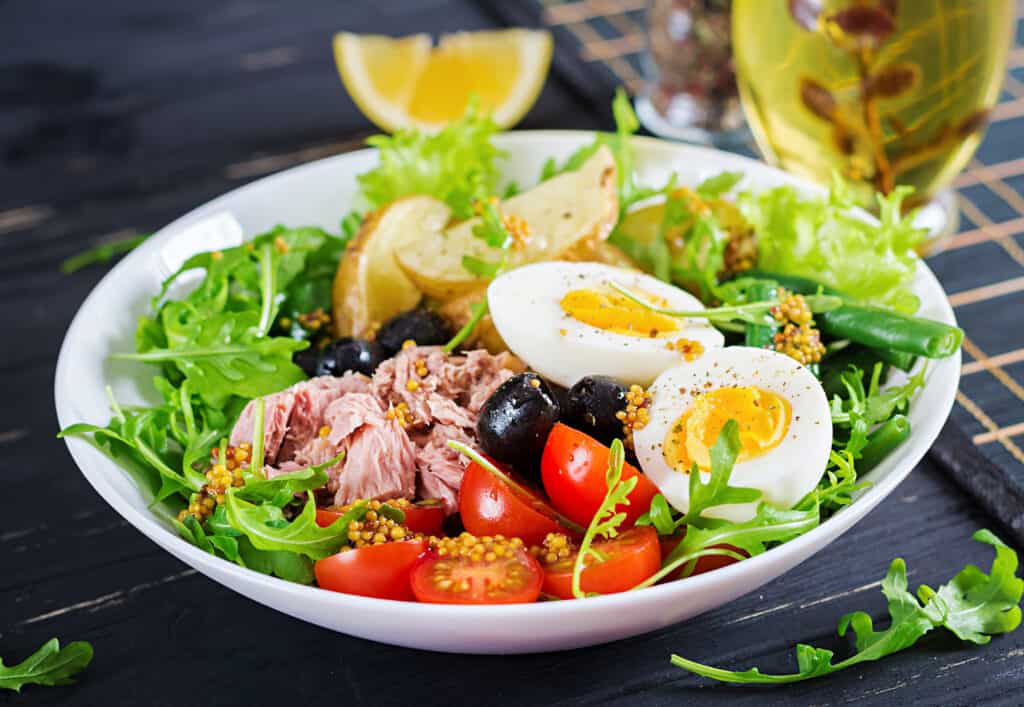Muscle is made up of approximately 80 percent protein. Therefore, protein metabolism, the breakdown of protein into amino acids, is critical for strength and development of muscle mass.
Collagen is made of protein and is the connective tissue in muscle that anchors muscles to bone. In addition, muscle function is dependent on energy production. Glucose (carbohydrate) is a key fuel for ATP production. We use glucose as the main fuel to produce energy in all cells, including muscle cells.
5 Vitamins and their Impact on Muscle Strength
The following six vitamins play an important role in helping to build and maintain strength levels.
Vitamin D
This fat soluble vitamin plays a very important role in immune and muscle function. There are numerous studies showing vitamin D is essential for overall immune system function. Vitamin D is required for the uptake and utilization of calcium and phosphorous too. Both of these minerals are required for muscular contraction, bone growth and strength.
Fish Oil or Omega-3 Fats
Omega-3 describes a specific form of fatty acids and may decrease muscle protein breakdown. This may be through improvements in insulin sensitivity, and insulin resistance, associated with muscle breakdown. There is also a study in the American Journal of Clinical Nutrition showing that fish oil helps enhance the effect of strength training in elderly women.
Vitamin C
This water soluble vitamin is important for our muscles, and we need it to function properly. It is an important supplement to take daily because it’s responsible for the health of the blood vessels, which support the muscles’ needs for oxygen and nutrients. Good sources of vitamin C include broccoli, tomatoes, strawberries, and grapefruit.
Vitamin E
Is a very important antioxidant that helps cell membrane recovery from oxidative stress. Cell membrane reliability is essential for cellular function and growth. To get more vitamin E into your diet, try eating more almonds, spinach, carrots, and avocados.

B Vitamins
An array of B vitamins are essential for muscle strength and tone. Vitamin B1 (thiamin) is important for protein metabolism and the formation of hemoglobin. One purpose of hemoglobin is to carry oxygen to muscle cells. Foods like bread, meat, rice, and nuts are high in vitamin B1.
Vitamin B2 (riboflavin) is critical in the body for energy metabolism. Riboflavin is also used for glucose metabolism and the oxidation of fatty acids. Cheese, eggs, milk, and peas contain high amounts of B2.
Then there is vitamin B3 (niacin), which is essential for energy production. Milk, eggs, fish, legumes, and potatoes are high in vitamin B3.
Vitamin B6 (pyridoxine) is important for protein metabolism, growth, and carbohydrate utilization. Foods like soybeans, butter, brown rice, and fish are high in vitamin B6.
Biotin (B7) is important for amino acid metabolism, and amino acids are the building blocks of protein. Good sources of vitamin B7 include mushrooms, egg yolk, beef liver, and brewer’s yeast.
And B12 (cyanocobalamin) is important for the maintenance of nerve tissue and is essential for the metabolism of fats and carbohydrates, energy metabolism, and cell regeneration. Milk, poultry, eggs, meat, and liver are high in vitamin B12.
Stay Strong Together
The Jefit app comes equipped with an advanced customizable workout planner and training log. Take advantage of Jefit’s exercise database for your strength workouts. Visit our members-only Facebook group. Connect with like-minded people, share tips, and advice to help get closer to reaching your fitness goals. Try one of the new interval-based workouts and add it to your weekly training schedule.
- Chrono-Nutrition to Improve Strength Training - February 4, 2026
- Velocity-Based Strength Training: Lift Smarter, Not Heavier - January 28, 2026
- Optimal Recovery Time for Strength Training - January 21, 2026
